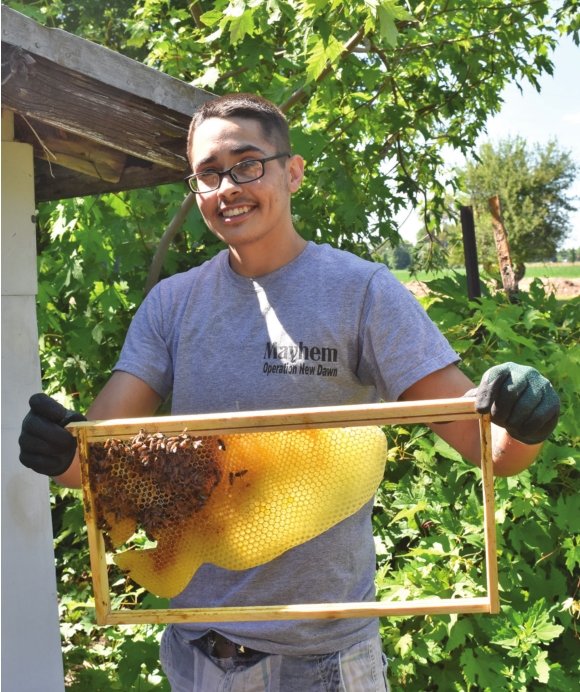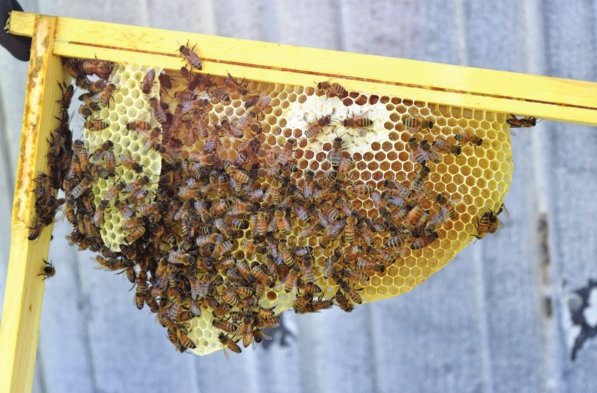
Down a dirt road north of Sunfield, Kyle Brown’s bee farm is a humble operation tucked amid farming fields and a red barn.
The sense of apple pie Americana is strong. Kittens run out to greet visitors and various old vehicles are strewn about in different states of repair.
“I’ve always had an interest in bees, but the way the book ‘Secret Life of Bees’ described them really resonated with me,” said the 25-year-old former Chinook and Blackhawk helicopter mechanic. “That started me on the path to when I see them, I try to rescue them,” he added.
His desire to rescue bees sprung while he was away from home.
“Before I came back to Michigan, I was stationed in Kansas for a while. My last six to 12 months, I started doing it in a city called Salina in West Kansas. I pulled them out of people’s houses and would take them to the country.”
Brown said 90 percent of his bee boxes, frames filled with honeybees and their honeycombs, were cut out of a house. First advertising on Facebook, Brown said he wanted to get the word out to people before they could accidentally mistake honeybees for hornets or wasps, and kill them out of ignorance.
His efforts drew attention on Lansing-based reddit pages, Brown said. “I used reddit in college. It was a really good platform to connect with anyone and everyone about anything. There is always someone on reddit that can help you out, or needs something done.”
Brown recalls a time he received a phone call just shy of midnight, which led to him spontaneously suiting up for a night catch. “I went all the way down to Battle Creek, then 45 minutes east. I did that swarm catch at midnight,” Brown said.
Beekeeping is an early morning business, said Brown. “I do a lot of my work early in the morning. I wake up around 5:30 or 6 a.m., especially during the summer. Once it gets warm, the comb gets melty and weak. If you pull something out and tip it to look at it, it is liable to fall, tip out and break.”
Driving as far as two hours out for a call, Brown said he does it for the love of bees and to keep their numbers up. “A lot of people charge to take them out of houses. I’ll do it for free, because I really just want to get the bees out of there and get them to a safe spot.”
A 2014 presidential memorandum on honeybee conservation from the Obama administration reported that, “Honeybee pollination alone adds more than $15 billion in value to agricultural crops each year in the United States.”
But honeybee numbers are dwindling.
The National Agriculture Statistics Service reports that there were 2.44 million honey-producing colonies in the United States in 2008, down from 4.5 million in 1980 and 5.9 million in 1947.
This trend is alarming, Brown said. “For humans, within four to seven years there will be no plant based food or very little.
Crops worldwide depend on honeybees. That’s not very good,” said Brown.
In Michigan, spring poses a specific threat to honeybees, said Brown. “About a month and a half after spring starts, we get a big die off when the farmers do all of their pesticides and everyone starts treating their yards,” Brown said.
However, some pest companies are making changes to address this problem, said Brown.
“I know what the exterminator company Orkin does specifically — when people call them out for honeybees they won’t do it and won’t kill them.”
Getting out to a rescue requires an assortment of beekeeping and common tools that ensure the safety of the bees and their hives.
“I have temporary boxes and if it’s a swarm, I’ll put the box under the tree and shake the limb to drop as many as I can in the box. Then I’ll seal them up and give them a minute to get used to it, and I’ll tape everything up and bring them home,” said Brown.
The honeybee rescue business calls for some homemade ingenuity as well. “I have a bee vacuum, which is just a small Shop-Vac with holes in the tubing, so I don’t kill the bees when I suck them up,” said Brown. “It is a little bit less pressure. I do that and put them in a temporary plastic box.”
After all his good Samaritan work, Brown doesn’t even sell his honey.
“When I get a couple frames of honey, I just kind of spin them out to family and friends and give them away. I just do it for the bees. I raise them and split them as many times as I can to build them back up.”
To contact Kyle Brown for a honeybee problem, email him at kylebrown_15@yahoo.com.
Support City Pulse - Donate Today!
Comments
No comments on this item Please log in to comment by clicking here